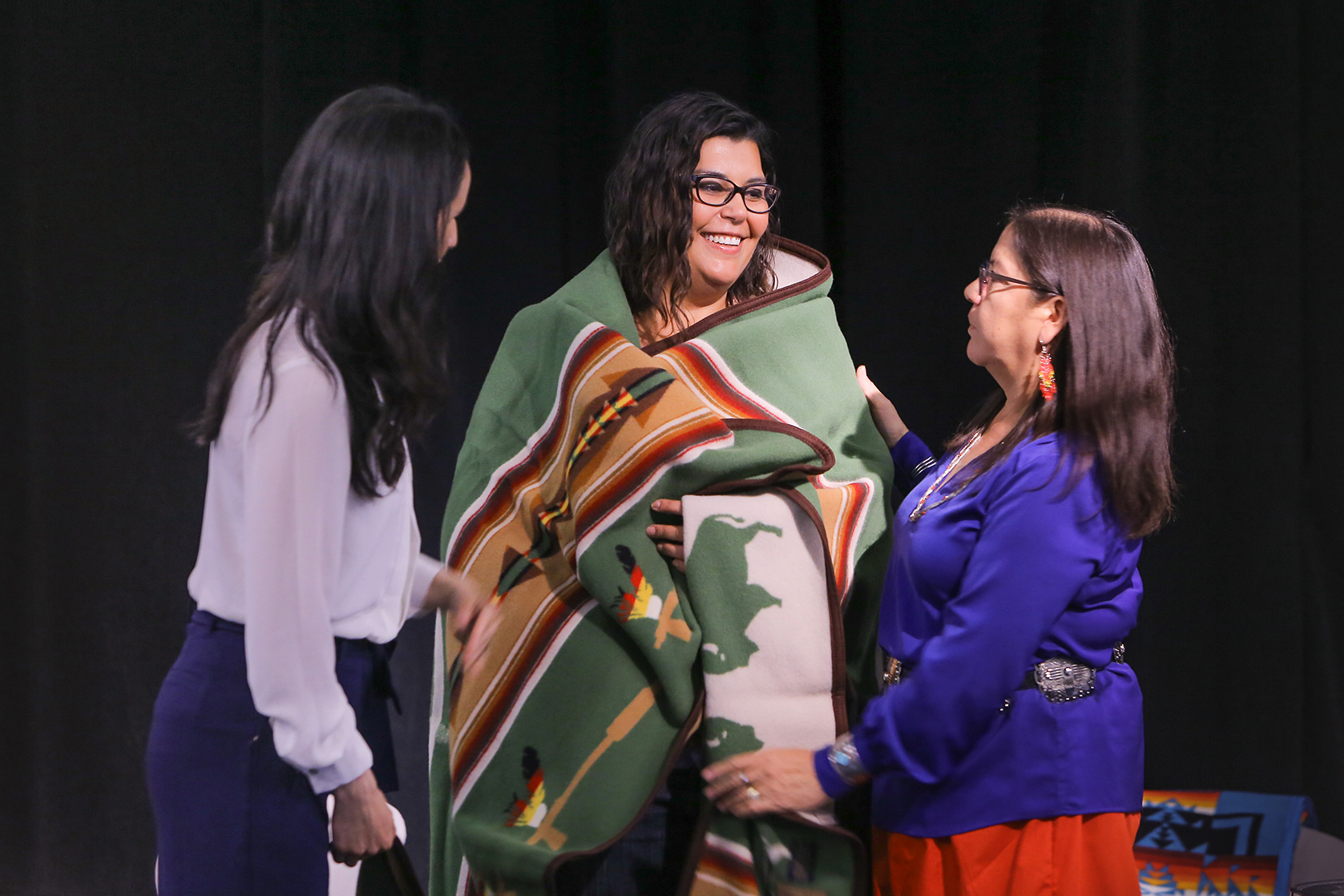
Marcia Anderson (centre) is presented with a blanket at the Faculty of Medicine & Dentistry's Indigenous Community Gathering. The full day event took stock of the progress in reconciliation with Canada's Indigenous peoples. (Photo credit: Ed Ellis)
Marcia Anderson wants all Canadians to break the silence and speak up, denouncing violence and ending practices that perpetuate harmful myths about Indigenous peoples, especially Indigenous women.
As keynote at the third annual Indigenous Community Gathering, Anderson, a Cree-Saulteaux physician and researcher and Chair of the Indigenous Health Network at the Association of Faculties of Medicine of Canada (AFMC), called on learners, staff, faculty, Elders, Knowledge Keepers and community members to continue acting together in building a shared vision of health for the well-being of Indigenous peoples.
"For a long time in health care, and in health professional education, we have wanted to see ourselves as not part of the problem, but as helping professionals who know what's best to do our best, to try to help people," said Anderson. "And I think we need to really get past that, because part of the attitude that causes the damage is our own blindness to our own contribution."
Anderson walked the audience through a timeline of reports on both the health concerns of Indigenous peoples and the statistics of violence and racism that prevent them-particularly women, girls and LGBTQ+ populations-from receiving appropriate care. She explained that most of the violence they experience is rooted in colonialism, racism, sexism, homophobia and transphobia, while other issues like poverty, food and housing insecurity only contribute to these bigger factors.
We are all Treaty people
The full day event titled Making Meaningful Momentum, took stock of the progress in reconciliation with Canada's Indigenous peoples. According to Elder Rick Lightning from Maskwacîs, slow but noticeable gains are being made.
Association of Faculties of Medicine of Canada's Joint Commitment to Action in Indigenous Health
Marcia Anderson also presented AFMC's recently-released Joint Commitment to Action in Indigenous Health, which tasks all 17 Canadian medical schools with taking concrete actions to address the 10 Action Statements in the areas of curriculum, admissions and anti-racism policies with the aim of creating greater inclusion of Indigenous peoples, safer educational environments for undergraduate and postgraduate medical education and to support improved health outcomes among Indigenous peoples.
Learn what the Faculty of Medicine & Dentistry is doing to honour this commitment here.
"Some people are living in a Cowboys and Indians phase, when prejudice is alive in Canada. But I'm really glad to say I think people are starting to put away those old thoughts, and realizing that as Canadians and as Albertans we need to work together," he said.
Lightning also encouraged non-Indigenous attendees to reflect on the importance of issues such as water, housing and health crises that disproportionately affect Indigenous peoples as shared concerns to address.
"Everything that is important to us now, is important to you. It's our children's future. It's not an Indian thing. It's a human thing."
"Some of us need to be a little 'difficult' amongst the settler world," said Jill Konkin, associate dean for the Division of Community Engagement, Faculty of Medicine & Dentistry. "We have to recognize that those of us who have more power and privilege have to give some of that up."
Konkin reminded the audience about eliminating the use of 'power words' such as 'vulnerable' when talking about Indigenous populations, highlighting their strengths over vulnerability. She also made an emotional recognition to the Indigenous Health Initiatives Program (IHIP), under the leadership of director Tibetha Kemble, for its work to increase the faculty's accountability.
Kemble presented the IHIP's annual report and the actions taken to develop the five pillars of its strategic plan: Indigenous health professionals, spaces and places, relationships, commitments and partnerships, and learning and development. She also updated communities on the latest changes in curricula and student admissions.
"We have made important progress on a number of priority initiatives such as admissions and curriculum and have worked as collaborative partners along the way," said Kemble. "But much remains to be done. I am hopeful that we will maintain the momentum created over the last year, building stronger partnerships and relationships with communities we serve and meeting our commitments to Indigenous people's health."
Looking ahead to honouring our commitments
As the Community Gathering came to a close, attendees wrote down their own commitments and actions to advocate for reconciliation and better supprt Indigenous health, which will be revisited during next year's event, titled Honouring Our Commitments.
The main takeaway for many attendees was the need for a change of attitude in order to achieve a meaningful momentum in Indigenous health. For Elder Lightning, this means eliminating the "untruths" of prejudice that have been passed down by previous generations.
"We can't change history, but we have to change our attitude. Get to know us, and you're going to find out we're actually really good people."
The Faculty of Medicine & Dentistry thanks all those who support our Indigenous Health Initiatives Program through the National Indigenous Health Sciences Circle. We are grateful to our partners from across the country for joining us at the third annual Indigenous Community Gathering on June 8 with presentations on the importance of advocacy, discourse and internalized racism. Other honoured guest speakers included Cal Chiefcalf, Indigenous curriculum specialist from the University of Saskatchewan, and Danielle Soucy, program coordinator of McMaster University's Indigenous Students Health Sciences Office.